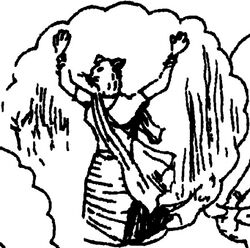Religion:Shapi Leima
| Shapi Leima | |
|---|---|
Goddess of rodents | |
| Member of Lairembis | |
 Goddess Shapi Leima | |
| Other names |
|
| Affiliation | Meitei mythology (Manipuri mythology) and Meitei religion (Sanamahism) |
| Animals | rodents |
| Symbols | rodents |
| Gender | Female |
| Region | Manipur, Northeast India |
| Ethnic group | Meitei ethnicity |
| Festivals | Lai Haraoba |
| Personal information | |
| Parents | Salailen (Soraren) |
| Siblings | Khunu Leima and Nganu Leima |
| Term | |
|---|---|
| English | Shapi Leima |
| Ancient Meitei | ꯁꯄꯤ ꯂꯩꯃ (sa-pee lei-ma) |
| Modern Meitei | ꯁꯕꯤꯔꯩꯃ (sa-bee-rei-ma) |
| Assamese | শবী লৈমা / শবীৰৈমা (sha-bee lei-ma / sha-bee-rei-ma) |
| Bengali | শবী লৈমা / শবীরৈমা (sha-bee lei-ma / sha-bee-rei-ma) |
| Hindi | शपी लैमा / शबी लैम (sha-pee lei-ma / sha-bee lei-ma) |
| Sanamahism | |
Shapi Leima (Shabi Leima) or Sapi Leima (Sabi Leima) is the goddess of rodents in Meitei mythology and religion. She is a sister of goddesses Khunu Leima and Nganu Leima. Legend says that all three sisters married the same mortal man.[1][2][3][4][5][6]
Etymology
The Meitei female given name "Sapi Leima" (ꯁꯄꯤ ꯂꯩꯃ) or "Sabi Leima" (ꯁꯕꯤ ꯂꯩꯃ) is made up of two component words. The two words are "Shapi/Sapi/Shabi/Sabi" (ꯁꯕꯤ) and "Leima" (ꯂꯩꯃ). "Sabi" (ꯁꯕꯤ) is a rat like animal. It lives in the clumps of bamboos.[7] It is known for having sharp teeth.[5] The word "Leima" (ꯂꯩꯃ) is further made up of two component words, "Lei" (ꯂꯩ) and "Ma" (ꯃ). "Lei" (ꯂꯩ) means land or earth. "Ma" (ꯃ) means "mother". Literally, "Leima" (ꯂꯩꯃ) can be translated as "Land Mother" or "Mother Earth". But in general context, "Leima" (ꯂꯩꯃ) means a queen or a mistress or a lady.[8]
Description
Shapi Leima (Shabi Leima) is described as the mistress of all the rodents of the world. At any time, she could summon all the rodents at any place she wishes. She is the youngest daughter of the god Salailen (alias Soraren).[2][3]
See also
- Ireima (Ereima), Meitei goddess of water
- Leimarel (Leimalel), Meitei goddess of earth
- Ngaleima, Meitei goddess of fish
- Phouoibi (Phouleima), Meitei goddess of agricultural crops
- Thumleima, Meitei goddess of salt
References
- ↑ (in mni) Tal Taret. 2006. pp. 39. https://archive.org/details/in.ernet.dli.2015.466201/page/n39/mode/2up.
- ↑ 2.0 2.1 (in mni) Tal Taret. 2006. pp. 48. https://archive.org/details/in.ernet.dli.2015.466201/page/n48/mode/2up.
- ↑ 3.0 3.1 (in mni) Manipuri Phungawari. 2014. pp. 203. https://archive.org/details/dli.language.0065/page/n203/mode/2up.
- ↑ Regunathan, Sudhamahi (2005) (in en). Folk Tales of the North-East. Children's Book Trust. ISBN 978-81-7011-967-8. https://books.google.com/books?id=xfDNm96yCPIC&q=Sabi+Leima+goddess+rodents&pg=PA70.
- ↑ 5.0 5.1 Singh, Moirangthem Kirti (1993) (in en). Folk Culture of Manipur. Manas Publications. ISBN 978-81-7049-063-0. https://books.google.com/books?id=q5eBAAAAMAAJ&q=Sabi+(+animal+sharp+teeth+)+.
- ↑ (in mni) Eben Mayogee Leipareng. 1995. pp. 107. https://archive.org/details/in.ernet.dli.2015.467071/page/n107/mode/2up.
- ↑ "Learners' Manipuri-English dictionary.Sabi". 2006. https://dsal.uchicago.edu/cgi-bin/app/sharma_query.py?qs=%EA%AF%81%EA%AF%95%EA%AF%A4&searchhws=yes.
- ↑ "Learners' Manipuri-English dictionary.Leima". 2006. https://dsal.uchicago.edu/cgi-bin/app/sharma_query.py?qs=%EA%AF%82%EA%AF%A9%EA%AF%83%EA%AF%A5&searchhws=yes.
Bibliography
- Glimpses of Manipuri Culture - Dr. Yumlembam Gopi Devi
- The History of Manipur: An early period - Wahengbam Ibohal Singh · 1986
External links
- "The Widow's Son :: Lukhrabi Macha Fungawari Singbul by B. Jayantakumar Sharma" (in en). http://www.e-pao.net/epSubPageSelector.asp?src=The_Widow_Son_Lukhrabi_Macha_By_Bidyarani_Thingujam&ch=manipur&sub1=Folks&sub2=Folk_Tales.
